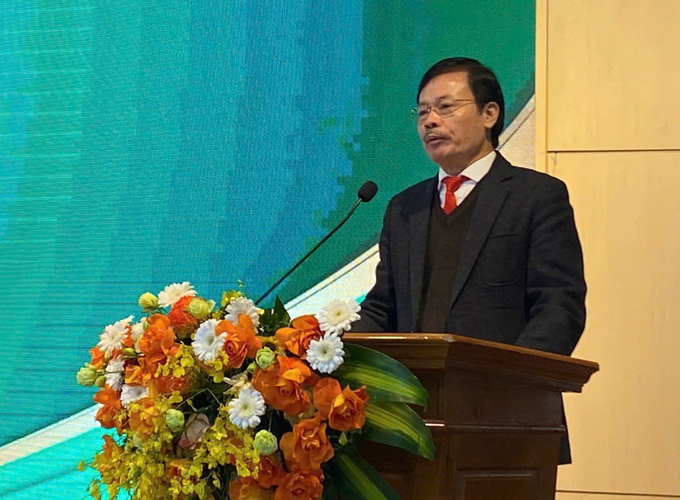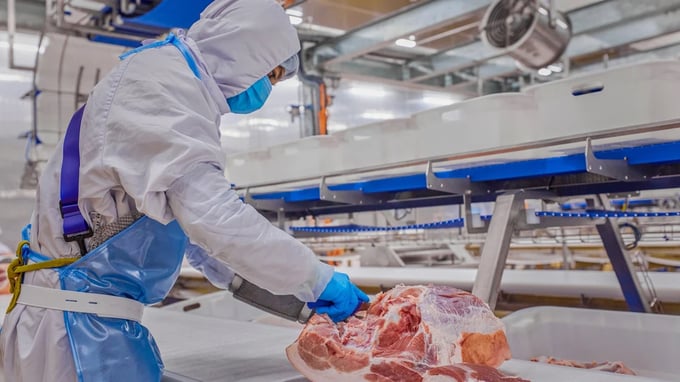November 26, 2025 | 20:31 GMT +7
November 26, 2025 | 20:31 GMT +7
Hotline: 0913.378.918
November 26, 2025 | 20:31 GMT +7
Hotline: 0913.378.918

Mr. Nguyen Xuan Duong, Chairman of the Vietnam Animal Husbandry Association: The livestock industry still has a big 'pain' of not being able to export many products. Photo: Minh Ha.
Mr. Nguyen Xuan Duong, Chairman of the Vietnam Livestock Association, addressed the 2024 Forum on Enterprises Supporting Farmers and Sustainable Development in Hanoi on the morning of December 18. He acknowledged that the livestock sector in Vietnam is faced with a substantial "pain point"—its inability to export a substantial volume of products—despite its accomplishments.
Livestock is essential for the preservation of food security and sustenance, as it is one of the four main agricultural sectors. Nevertheless, Vietnam's domestic livestock market is still underdeveloped in comparison to other countries, and its export levels are modest in comparison to other agricultural sectors. Mr. Duong emphasized the significant obstacles that the industry is currently facing, such as the limited space available for livestock farming as a result of the high population density.

Vietnam's exports of animals and animal products are still very modest.
Vietnam's livestock density is among the highest in the globe. For example, the nation is the sixth largest in the world for swine farming and is second only to China in waterfowl farming.
In contrast, domestic production has experienced a mere 2-3% growth rate, while imports of livestock products have been expanding at a rapid pace, with annual growth rates of 15-20% for pork and poultry.
Mr. Duong underscored that Vietnam's livestock industry is gradually transitioning toward sustainability and professionalism, which presents opportunities for businesses to redefine their development strategies, enhance value, and satisfy integration requirements, despite these challenges.
He advocated for eliminating obsolete and superfluous procedural obstacles, including the existing product conformity announcement regulations, which he characterized as excessively formalistic. These regulations result in the inflation of product prices, the loss of business opportunities, and the promotion of negative practices, all of which are superfluous for both individuals and businesses.
To improve the competitiveness of domestic products, reduce costs, and expedite processes, Mr. Duong suggested the merger of the Law on Product and Goods Quality with the Law on Standards and Technical Regulations. He also emphasized the importance of businesses collaborating with farmers to promote the livestock industry's growth, recognizing their significant role in rural development and the agricultural value chain.

Mr. Ho Xuan Hung, Chairman of the General Association of Agriculture and Rural Development, called on businesses to actively contribute ideas to the authorities to promptly adjust mechanisms and policies. Photo: Tung Dinh.
Mr. Ho Xuan Hung, Chairman of the Vietnam General Association of Agriculture and Rural Development, agreed with Mr. Duong's opinion on the role of enterprises in the attainment of agricultural triumphs during the initial 11 months of 2024.
Nevertheless, he emphasized that the number of businesses investing in this sector is still relatively low as a result of the absence of sufficiently robust mechanisms and policies that promote and support business participation. Furthermore, the current initiatives to mobilize, attract, and facilitate business engagement are ineffective, which has led to a restricted appeal. The connection between enterprises and farmers is also weak, resulting in a passive position for farmers in terms of production and consumption.
Mr. Hung encouraged enterprises to participate in networking activities, suggesting ideas and solutions to government agencies to promptly modify policies and mechanisms to reflect current circumstances. He encouraged all stakeholders to work together to establish a sustainable and environmentally friendly agricultural foundation.
Translated by Linh Linh

(VAN) China’s cooking oil is suddenly flooding into India. It all comes down to a soybean surplus that Beijing doesn’t quite know what to do with.

(VAN) An Giang promotes supply-demand connections, standardizes quality and builds value chains, creating a foundation for sustainable bird’s nest development and aiming to expand exports.
/2025/11/24/5339-4-nongnghiep-075331.jpg)
(VAN) Recently, the conference on 'Sustainable Fisheries Linkage Chain - Tilapia for Export' took place in Tien Hai commune, Hung Yen province.
/2025/11/21/4309-2-153400_128.jpg)
(VAN) Green and low-emission rice is paving the way for Vietnamese rice to enter high-end markets, marking the beginning of a transformation journey toward greening and elevating the national rice brand.

(VAN) ‘Right to Win’ outlines a national action plan that shapes a new vision for Viet Nam’s agriculture in an era of renewal and global integration.

(VAN) Lam Dong’s farmed sturgeon output this year is expected to reach 2,300 tons, worth VND 450 billion, affirming the brand’s position on the market.

(VAN) A surge in Ukrainian egg exports, largely driven by soaring sales to the UK over the last few years, has notably pushed up egg prices on the domestic market.